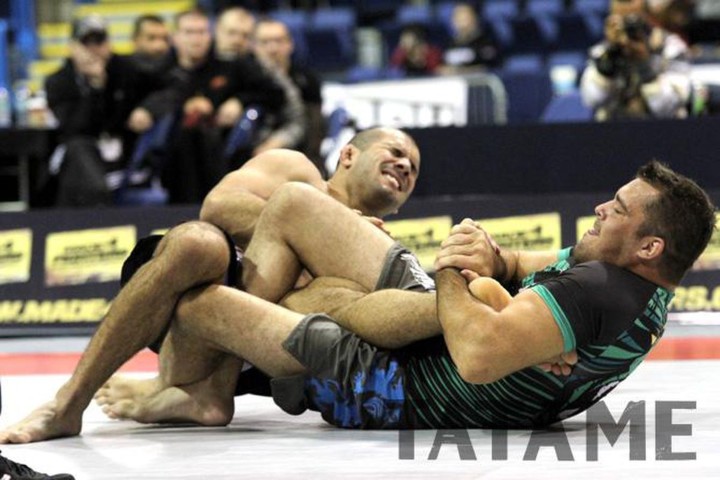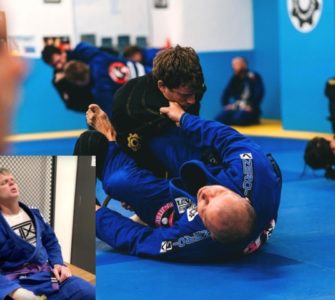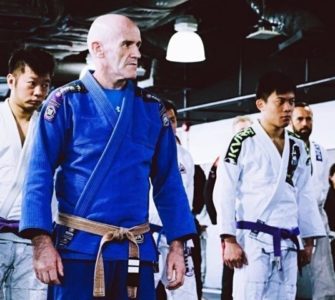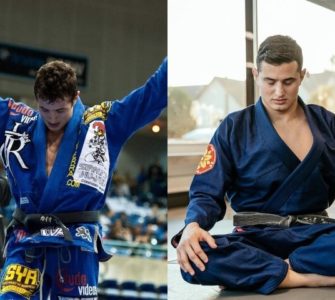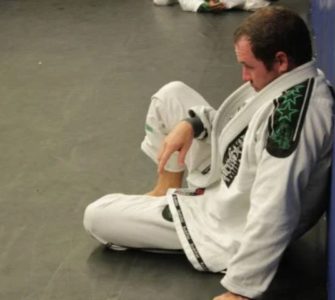A household name in almost any BJJ community, Dean Lister is a 2 time ADCC World Champion and, perhaps more importantly, one of the jiujiteiros who are most responsible for the last decade’s formidable and fast development of submission techniques. He was one of the early „revolutionaries“ in the art of leglocks, having famously influenced John Danaher‘s views by asking him: „Why would you ignore 50% of the human body?“
We had a chance to speak with Dean and to listen on how it was that he started playing the leglock game, what advice he’d give to someone who wants to become a better grappler, as well as on the importance of choosing your girlfriend or boyfriend carefully if you have big dreams.
BJJEE: We’re delighted to have you here, Dean. Thank you for being a part of this interview.
We’d like to start it off by asking: how have you been lately? Are there any projects or goals that you’ve set your focus upon?
Dean: Great to be talking to you, all is good. I am blessed to still be teaching and doing what I want to do with my life. Nothing’s new in particular, but I might be looking at a few submission matches soon.
BJJEE: Awesome, it will be a great pleasure to watch you win! But for now, would you please tell us how was it that you „found out“ about grappling? You trained Sambo and Wrestling before you did BJJ – why did you start training these sports?
Dean: It is a very long story. But, basically, I started training because I found it to be very important to defend myself when I was young. This was because I was a US military kid living in Panama, Central America, during the US-Panama invasion in 1989.
Many Panamanian kids, who were around the age of 13 to 15 years old, had lost their families in the war and were angry at me because of where I was from. I never liked to fight, but there were plenty of times that I had to. And Wrestling seemed to help me a lot with that. That’s the main reason.
BJJEE: So, it could be said that you started grappling out of necessity. But it was your choice to keep on training – mainly in Jiu Jitsu, after you’ve started training it – even in the most difficult periods of your life.
Specifically, there was a time in your life that you were both going to college and working full time – and training at the same time! Yet, you persevered and made it into a story of inspiration for others.
Would you be kind enough to share with our readers a little bit more about your story from that period? How was it that you overcame the hardships?
Dean: I know for certain that I have been through some tough times. But, of course, everyone has or will have hard times in their lives.
Yes, I was working and going to college and training at the same time. But, even though it may seem strange to say it, I always believed in my dreams. I never thought they would come easily of course, as life isn’t easy – but I never thought that „unrealistic things“ are actually unrealistic.
There were many difficult things that happened. For example, I had a girlfriend for about 2 years at the time, and her parents made us stop seeing each other because they thought that I was living in a world without a future in sight. They thought that I wouldn’t become a champion.
They didn’t see what I saw, of course. They thought that sport and college were both a waste of time, while I thought of all of these things as life experiences.
BJJEE: So, all of the difficulties that you’ve experienced in your life – you never saw them as anything more than necessary life experiences?
Dean: Anytime that something difficult had happened to me, I only thought of it as one more price to pay until I was successful. I was even homeless for a short while… At least I had a car I could sleep in!
I thought of everything as a test. Nothing more or less.
BJJEE: This sort of mentality has definitely transferred to your mentality in matches as well.
Dean: Yes, to this day… The harder a match is, the more that others doubt me or say that I will lose – the more motivation I have. And that is not because I am angry, but simply because I know that it is a test.
I definitely do know a few athletes that are tougher than I am, but they can sometimes lose focus when things get frustrating. I never really lost my focus on what I needed to do. For example, I couldn’t understand the Spanish language when I was young and so I didn’t know what other people were saying, as well as those kids that wanted to fight me. So I first learned to fight a little bit and then learned the language.
It’s all just a test.
BJJEE: And it all serves the purpose of becoming better. You, however, did not only become better in your personal right, but you played an important role in the progress of BJJ progress as well.
Among other things, you’re one of the jiujiteiros that are responsible for popularizing the use of leglocks. How did it come that you started utilizing them when almost nobody else did?
Dean: I was never too shy to ask questions about things… I’m sure this was frustrating to others at times when I was young… So, I would have thought and asked: „Why is this way better? Who thought it is? Is there a better way to do it for me?“
Perspective is very important. For example, before Jiu Jitsu I was competing in Sambo and before that in Wrestling. While Jiu Jitsu is my home, I definitely know that Sambo and Wrestling have both helped me achieve my goals – in a similar fashion that learning more than one language can help much in life. It gives you a different perspective on things.
BJJEE: So, you took a different perspective on leglocks as well? What was the usual opinion about leglocks back in the day?
Dean: Back then, I’ve heard a saying in Portuguese that said: „The choke is the king, the arm lock is the queen, but the foot lock is the dirty thief.“ And I thought to myself – okay, but why? Just because someone has said that it is? „The dirty thief can be very dangerous and you should be aware of him“, that’s what I responded with in Portuguese.
It’s only a different perspective. It is also an objective „truth“ and truths are undeniable. If something works, it won’t be ignored for long.
So, I had great successes with them from the very beginning. Sure, I have lost many matches because I went for a sloppy leglock; but I have also, for example, finished 8 out of 8 matches in one day all by leglocks.
I never neglected the techniques of guard passing, I just knew that leglocks work.
BJJEE: And this development has also led to you introducing John Danaher to the famous question: „Why would you ignore 50% of the human body?“
Dean: Yes, that is a true story of the time when I met John Danaher in New York, in the year of 2000. And I am very complimented that this idea has impacted his life so much.
BJJEE: What would you recommend, as a piece of all-around advice, to someone who wants to get better in the art of leglocking?
Dean: First of all, I wouldn’t focus specifically on heel hooks, because they are something that must be done responsibly; in order not to hurt yourself or your training partners. You should study all leglock variants and you should learn how to combine them with sweeps from the bottom and with guard passing from the top.
I also wouldn’t „suggest“ to become only a foot lock specialist, because a real submission fighter cannot neglect the other 50% of the human body; the neck and the arms. You need to remain open-minded at all times, because there is always something to learn.
One of the best tips that I have for leglocks or other submissions is to do much more positional sparring. This is so that you can take a chance, and if you make a mistake then you can simply restart. This will help with your confidence.
For example, let’s say that I am starting on top with open guard – if I pass, then good, I will restart. If I get a leglock, good, I shall restart. If I fall over and lose the leglock, ok – restart. If I am swept, well, okay, let’s restart… This is how much training repetition should be done in order to develop skills.
BJJEE: Awesome advice, thank you very much for sharing them! Now, you have won many medals and tournaments throughout the years… What would be your favorite one?
Dean: I’d say that it is a tie between two tournaments: between my gold medal in 2003 and my gold medal in 2011.
I was new and competing in Brazil in 2003, in the Open Division. It was the craziest day of my life – in the morning I was basically unknown and in the afternoon I was on television in Brazil, being the absolute World champion! Plus, I was young so I had even more fun! It was a new feeling for me and I couldn’t sleep for 5 days, so I got sick (laughs).
2011 was great for different reasons. I saw that people wrote that I was too old and that I had a good history, but that my time and the world have passed me. This fueled my drive to win.
BJJEE: And that just goes on to prove that your contribution to the sport was not just in technique development and remarkable wins, but also in the time that you’ve been a part of the community.
Which things do you remember being different in training and competitions back when you started, as compared to today’s BJJ scene?
Dean: I don’t know how I could answer this in a short way, but I’ll try to. For starters, the sport is much more popular nowadays and more people are training. I think that the athletes are better today because so many of them are a part of the sport. Also, the techniques are much more developed now as well, and the sport is more organized.
Back then, it was „tougher“ in general. Each time has its good and bad things… But, back then, you never knew who you were fighting. Another thing is that I had to drive all over the country in order to train with quality. I know that, even today, there are some people who also travel to train… But, back then, you absolutely HAD to do so.
When I first started, people could do neck cranks. You could slam people. More things broke than today. I am not saying this is good – as a matter of fact, it is not.
There might have been a generally higher degree of respect between fighters and athletes. People didn’t jump from team to team (sometimes they did, but that was rare); but because of this, most grapplers trained in one style only as well.
One other thing was that back in my day, the youth didn’t complain as much as the young people do today. Although, I am sure that my parent’s generation complained even less about it.
BJJEE: Thank you for the concise and great insight, Dean. We’ve reached the end of our interview; is there any last piece of advice that you’d like to share with the young jiujiteiros who are reading this interview?
Dean: Relax and don’t give up. Find a good coach and a good team. If you want to be a professional in grappling one day and make money, make sure that you have a back-up plan; a job or a career that you can turn to, in case something unexpected happens with your life.
Be careful of who you choose as your girlfriend or boyfriend. This is very important, as it can turn out very positively or very negatively for you, depending on who you’re with. I know several fighters who could’ve been world level, but who made a wrong decision with their boyfriend or girlfriend. I got to meet men and women that no one else will ever know.
I don’t want to sound super negative, but you need to realize that many people don’t want to see you happy or successful or achieving your dreams in life. An average person, someone you might not even know, will consciously or subconsciously send negative energy towards your dreams.
„What, you think that you could win that tournament? No, those guys are too strong for you!“ Or: „You think that you could be a doctor? Do you know how much time and studying and money that will cost you?“ These are very common and come in various shapes and sizes.
So, don’t tell your dreams to strangers or to people that you don’t care about. Ignore the negative opinions and gossip – OR make these things work for you. They will make you stronger, as they have made me!
BJJEE: Thank you very much, Dean. We are certain that your insights and wonderful advice will be met with a lot of enthusiasm!
Dean: You’re welcome. I hope that all is good at BJJEE, my regards to everyone! Thank you!
How To Surprise and Submit Your Opponents On the Mat. Even Younger, Stronger, Faster & Higher Ranked Beasts – With The Most Lethal & Least Understood Attack In Grappling: The Leglock.
Leglocks Are The Great Equalizer.
Dean Lister’s System Is Almost Like Cheating Because Your Adversaries Aren’t Taught To Defend It.

